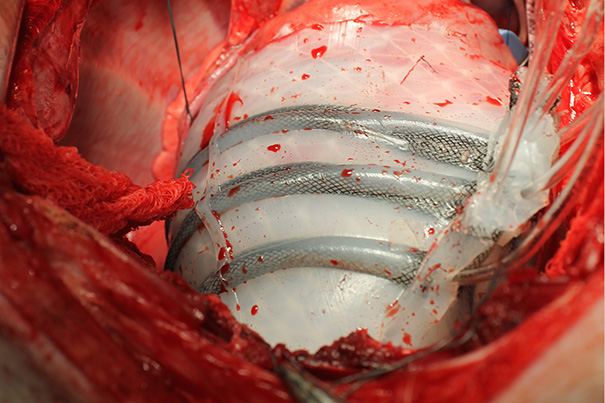
An innovative soft robotic sleeve which can help a heart to beat has been developed by researchers including Dr Ellen Roche of National University of Ireland Galway.
The soft robotic sleeve wraps around the organ, twisting and compressing in synch with the beating heart, potentially opening new treatment options for people suffering from heart failure.
Dr Roche is the paper’s first author and former PhD student at the Harvard John A. Paulson School of Engineering and Applied Sciences (SEAS) and The Wyss Institute of Biologically Inspired Engineering at Harvard University. The research took place at Harvard and at Boston Children’s Hospital.
While other therapeutic systems known as ventricular assist devices (VADs) are already used to sustain end-stage heart failure patients awaiting transplant, they extend lives albeit at a high risk due to the number of complications that can occur resulting from their design.
Complications include the risk of clotting requiring patients to take potentially dangerous blood thinner medications. Unlike VADs, the soft robotic sleeve does not directly contact blood, avoiding that risk.
With heart failure affecting 41 million people worldwide, the hope is the device may one day be able to bridge a patient to transplant or to aid in cardiac rehabilitation and recovery.
“This research demonstrates that the growing field of soft robotics can be applied to clinical needs and potentially reduce the burden of heart disease and improve the quality of life for patients,” explains Dr Roche, now a postdoctoral researcher with Professor Peter McHugh in biomedical engineering at National University of Ireland Galway, where she also previously studied for her undergraduate degree in Biomedical Engineering.
To create an entirely new device that does not come into contact with blood, the researchers took inspiration from the heart itself. The thin silicone sleeve uses soft pneumatic actuators placed around the heart to mimic the outer muscle layers of the mammalian heart. The actuators twist and compress the sleeve in a similar motion to the beating heart. The device is tethered to an external pump, which uses air to power the soft actuators.
“The sleeve can be customized for each patient,” said Dr Roche. If a patient has more weakness on the left side of the heart, for example, the actuators can be tuned to give more assistance on that side. The pressure of the actuators can also increase or decrease over time, as the patient’s condition evolves.
More research needs to be done before the sleeve can be implanted in humans but the work is an important first step towards an implantable soft robot that can augment organ function.
“This research is really significant at the moment because more and more people are ending up with heart failure,” said Roche. “Soft robotic devices are ideally suited to interact with soft tissue and give assistance that can help with augmentation of function, and potentially even healing and recovery.”
From the Harvard University website
